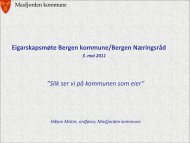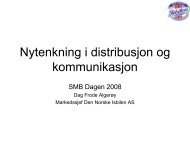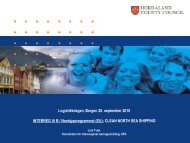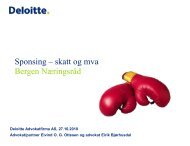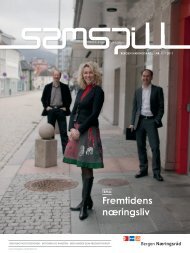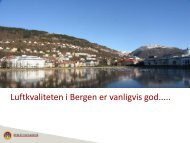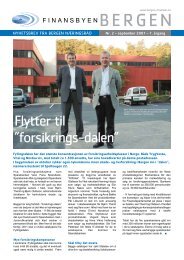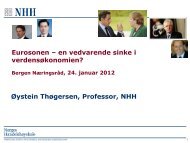Knut Anton Mork, Handelsbanken
Knut Anton Mork, Handelsbanken
Knut Anton Mork, Handelsbanken
Create successful ePaper yourself
Turn your PDF publications into a flip-book with our unique Google optimized e-Paper software.
MAKROØKONOMISK ANALYSE<br />
Det går likar’ no!<br />
Konjunkturrapport april 2011<br />
<strong>Knut</strong> <strong>Anton</strong> <strong>Mork</strong>, +47-2239-7181, knmo01l@handelsbanken.no<br />
Ida Wolden Bache, +47-2239-7340, idba01@handelsbanken.no<br />
Shakeb Syed, +47-2239-7007, shhu02@handelsbanken.no<br />
Nils Kristian Knudsen, +47-2282-3010, nikn02@handelsbanken.no<br />
5. april 2011
Global økonomi<br />
Nye kriser, men gjeninnhentning har fått fotfeste<br />
Regionale variasjoner, men felles trend: Energi- og råvarepriser<br />
Kortsiktige faktorer<br />
Langsiktig stram balanse mellom tilbud og etterspørsel<br />
2
Global økonomi<br />
Gjeninnhentning: Regionale variasjoner<br />
Overoppheting i framvoksende økonomier<br />
Svakt i Japan etter jordskjelv<br />
3<br />
USA sterkere, men med risikofaktorer<br />
Europa spriker
Global økonomi<br />
Rentenormalisering—et sunnhetstegn?<br />
Federal Reserve venter, men avslutter<br />
‖kvantitative lettelser‖<br />
Bank of England i dilemma<br />
4<br />
ESB signaliserer snarlig heving
Norske makroutsikter<br />
Stadig lysere tider<br />
Veksten i norsk økonomi tok seg opp i fjor<br />
Vi tror konjunkturoppgangen fortsetter<br />
5<br />
God vekst i husholdningenes forbruk<br />
Kraftig oppsving i investeringene<br />
Svakere impulser fra finanspolitikken<br />
Moderat eksportvekst<br />
Vekstprognosene oppjustert siden i høst,<br />
men noe lavere enn SSB og Norges Bank<br />
2010 2011 2012 2013<br />
Fastlands-BNP 2,2 3,0 3,3 2,8<br />
BNP 0,4 2,0 2,2 1,9
Norske makroutsikter<br />
Husholdningene tilbake på banen, sterk boligprisvekst<br />
6<br />
2010 2011 2012 2013<br />
Privat konsum 3,6 3,3 3,3 3,0
Norske makroutsikter<br />
Mot kraftig oppsving i investeringene<br />
7<br />
2010 2011 2012 2013<br />
Olje og gass -12,6 12,0 5,2 2,7<br />
Boliger -3,5 9,0 9,0 5,6<br />
Næringsliv fastland -4,2 6,0 5,4 3,9
Norske makroutsikter<br />
Ledighetsfallet bremses av økt arbeidsstyrke, lønnsveksten på vei opp<br />
8<br />
100<br />
90<br />
80<br />
70<br />
60<br />
50<br />
40<br />
30<br />
20<br />
10<br />
0<br />
Andel bedrifter som sier produksjonen<br />
er begrenset av tilgang på arbeidskraft<br />
2006 (November) 2010 (September) 2011 (Februar)<br />
2010 2011 2012 2013<br />
Sysselsetting 0,0 1,0 1,5 1,7<br />
Arbeidsledighet (AKU) 3,6 3,4 3,3 3,1<br />
Årslønnsvekst 3,8 4,2 4,5 4,5<br />
Kilde: Norges Banks regionale nettverk
Norske makroutsikter<br />
Gradvis høyere inflasjon, men fortsatt under målet<br />
9<br />
2010 2011 2012 2013<br />
Inflasjon KPI 2,5 1,9 1,8 2,1<br />
Kjerneinflasjon KPI-JAE 1,4 1,1 1,8 2,1
Renteutsikter<br />
Renteoppgang i sikte….<br />
Norges Banks siste renteprognose<br />
25bp heving i mai eller juni<br />
10<br />
To hevinger i løpet av 4.kvartal<br />
Vi tror på færre hevinger enn<br />
Norges Bank lenger fram<br />
Høyere påslag i pengemarkedet<br />
Lavere internasjonal vekst<br />
Vår prognose<br />
25bp i juni, men mai ikke umulig<br />
25bp i oktober, til 2,5%<br />
2,75% innen utgangen av 1.kv 2012<br />
4.april 3 mnd 6 mnd 12 mnd<br />
Styringsrente 2,00 2,25 2,25 2,75<br />
NIBOR, 3mnd 2,69 2,75 2,95 3,45
Renteutsikter<br />
….men risiko på begge sider<br />
Argumenter for raskere renteoppgang<br />
Oljeprisoppgang:<br />
Høyere inflasjon, raskere rentehevinger fra handelspartnerne, høyere oljeinvesteringer<br />
Boligpriser og gjeldsvekst<br />
Argumenter for tregere renteoppgang<br />
Forverring av gjeldskrisen, problemer for europeisk banksektor<br />
Ringvirkninger til norsk økonomi gjennom finanssektor og lavere etterspørsel fra utlandet<br />
Lavere enn ventet inflasjon.<br />
Vår prognose: Kjerneinflasjonen opp til 1,5% mot slutten av året.<br />
11
Renteutsikter<br />
Oppgangen i lange renter vil fortsette<br />
12<br />
4.april < 3 mnd < 6 mnd < 12 mnd<br />
10 år norsk stat 3,84 3,75 4,15 4,40<br />
10års norsk swap 4,63 4,55 4,95 5,20
Valutautsikter<br />
Kronen ventet å styrkes mot euro, svekkes mot dollaren<br />
13<br />
4.april 3 mnd 6 mnd 12 mnd<br />
EUR/NOK 7,82 7,80 7,80 7,60<br />
USD/NOK 5,49 5,40 6,00 6,60<br />
CHF/NOK 5,94 5,90 5,80 5,45
Spesialtema: Oljepengene<br />
Tre debatter<br />
Er oljepengene fra handlingsregelen blitt brukt fornuftig?<br />
14<br />
Investeringer og skattekutt vs forbruk og trygd<br />
Investering av oljefondet<br />
Innenlandske realinvesteringer vs global finansinvestering<br />
Norsk økonomi etter oljen<br />
Enkel reorientering vs smertefull omstilling
Spesialtema: Oljepengene<br />
Handlingsregelen<br />
Innført mars 2001<br />
Tillater oljekorrigert, strukturelt underskudd tilsvarende 4% av oljefondets balanse, som<br />
gjennomsnitt over tid<br />
Fra vern mot hollandsk syke til formuespreservering for framtidige generasjoner<br />
Prinsipp om finanspolitisk nøytralitet forlatt<br />
Folkelig krav om del i godene<br />
Våre uttalelser oktober 2000:<br />
‖Verken rimelig eller mulig å holde igjen stort lenger‖<br />
15<br />
―I stedet for forgjeves forsøk på å holde igjen trenger vi seriøs diskusjon om hvordan pengene kan<br />
brukes på fornuftig måte‖<br />
―Inflasjon ikke det største problemet—kan unngås med rentestyring‖<br />
―Tradisjonell industri vil måtte vike om tjenestesektoren skal vokse‖<br />
―Start oppbygginsprosessen…Invester i mennesker‖<br />
―Virkelig tragedie ville være om vi brukte opp alle pengene i full fart uten å få noe igjen‖
Spesialtema: Oljepengene<br />
Hva har pengene gått til?<br />
Regjeringens opprinnelige intensjon (St.m. 29, 2000 – 2001) å bruke økt handlingsrom til:<br />
‖…å redusere skatter og avgifter‖<br />
16<br />
‖…styrke vekstevnen‖<br />
‖…bedret infrastruktur‖<br />
‖…forskning og utvikling‖<br />
Hva har skjedd?<br />
Penger spredt på mange formål<br />
Pensjon og trygd har steget i takt med budsjettet—motsatt av intensjon<br />
Konsum og inaktivitet vs investering og skattekutt
Spesialtema: Oljepengene<br />
Investering av oljefondet<br />
Finansiell investering risikabelt—systemisk risiko<br />
Verdi av innenlandsk realkapital også avhengig av verdensøkonomien<br />
Lønnsomme investeringer bør gjennomføres uavhengig av finansieringskilde<br />
Hva er lønnsomt?<br />
Finansdepartementet restriktivt—men nytt utvalg<br />
17<br />
Kontrast mot liberale trygderegler
Spesialtema: Oljepengene<br />
Etter oljen<br />
SSB<br />
Arbeidskraft og kapital like produktive i alternativ virksomhet<br />
18<br />
Midlertidig grunnrente spart i oljefondet<br />
Bjørnland og Moen (og vi, okt. 2009, apr 2010)<br />
Fastlandsøkonomien nyter geografisk fortrinn som leverandører i bred forstand<br />
Fastlandsøkonomien tar del i grunnrenta—vil falle bort etter oljen
Spesialtema: Oljepengene<br />
Oljeinntekter i offentlig sektor<br />
Staten sparer netto kontantstrøm fra oljevirksomheten…<br />
…men ikke skatter og avgifter fra fastlandsøkonomiens grunnrente<br />
Behov for debatt om velferdsstatens framtid<br />
19
Research Disclaimers<br />
<strong>Handelsbanken</strong> Capital Markets, a division of Svenska <strong>Handelsbanken</strong> AB (publ) (collectively referred to herein as ‗SHB‘) is responsible for the preparation of research reports. All research reports are prepared from<br />
trade and statistical services and other information which SHB considers to be reliable. SHB does not represent that such information is true, accurate or complete and it should not be relied upon as such.<br />
In no event will SHB or any of its affiliates, their officers, directors or employees be liable to any person for any direct, indirect, special or consequential damages arising out of any use of the information contained in<br />
the research reports, including without limitation any lost profits even if SHB is expressly advised of the possibility or likelihood of such damages. No independent verification exercise has been undertaken in respect of<br />
this information. Any opinions expressed are the opinions of employees of SHB and its affiliates and reflect their judgment at this date and are subject to change. The information in the research reports does not<br />
constitute a personal recommendation or investment advice.<br />
Reliance should not be placed on reviews or opinions expressed when taking investment or strategic decisions. SHB, its affiliates, their clients, officers, directors or employees own or have positions in securities<br />
mentioned in research reports. SHB and/or its affiliates provide investment banking and non-investment banking financial services, including corporate banking services; and, securities advice to issuers of securities<br />
mentioned in research reports. This document does not constitute or form part of any offer for sale or subscription of or solicitation of any offer to buy or subscribe for any securities nor shall it or any part of it form the<br />
basis of or be relied on in connection with any contract or commitment whatsoever.<br />
Past performance may not be repeated and should not be seen as an indication of future performance. The value of investments and the income from them may go down as well as up and investors may forfeit all<br />
principal originally invested. Investors are not guaranteed to make profits on investments and may lose money. Exchange rates may cause the value of overseas investments and the income arising from them to rise<br />
or fall.<br />
This research product will be updated on a regular basis. The distribution of this document in certain jurisdictions may be restricted by law and persons into whose possession this document comes should inform<br />
themselves about, and observe, any such restrictions. No part of SHB research reports may be reproduced or distributed to any other person without the prior written consent of SHB. Research reports are distributed<br />
in the UK by SHB.<br />
SHB is authorised by the Swedish Financial Supervisory Authority (Finansinspektionen), and authorised and subject to limited regulation by the UK Financial Services Authority. Details about the extent of our<br />
authorisation and regulation by the UK Financial Services Authority are available from us on request.In the United Kingdom, the research reports are directed only at Professional clients and Eligible counterparties (as<br />
defined in the rules of the FSA) and the investments or services to which they relate are available only to such persons. . The research reports must not be relied upon or acted on by private customers. UK customers<br />
should note that SHB does not participate in the UK Financial Services Compensation Scheme for investment business and accordingly UK customers will not be protected by that scheme.This does not exclude or<br />
restrict any duty or liability that SHB has to its customers under the regulatory system in the United Kingdom.<br />
SHB employees, including analysts, receive compensation that is generated by overall firm profitability. The views contained in SHB research reports accurately reflect the personal views of the respective analysts,<br />
and no part of analysts‘ compensation is directly or indirectly related to specific recommendations or views expressed within research reports.<br />
For specific analyst certification, please contact Robert Gärtner +45 33418613.<br />
In the United Kingdom SHB is regulated by the FSA but recipients should note that neither the UK Financial Services Compensation Scheme not the rules of the FSA made under the UK Financial Services and<br />
Markets Act 2000 for the protection of private customers apply to this research report.<br />
When Distributed in the United States<br />
Important Third-Party Research Disclosures:<br />
Research reports are prepared by SHB for information purposes only. SHB and its employees are not subject to the FINRA‘s research analyst conflict rules. SHB research reports are intended for distribution in the<br />
United States solely to ―major U.S. institutional investors,‖ as defined in Rule 15a-6 under the Securities Exchange Act of 1934. Each major U.S. institutional investor that receives a copy of research report by its<br />
acceptance hereof represents and agrees that it shall not distribute or provide research reports to any other person. Reports regarding fixed-income products are prepared by SHB and distributed by SHB to major U.S.<br />
institutional investors under Rule 15a-6(a)(2). Any U.S. person receiving these research reports that desires to effect transactions in any fixed-income product discussed within the research reports should call or write<br />
SHB. Reports regarding equity products are prepared by SHB and distributed in the United States by <strong>Handelsbanken</strong> Markets Securities Inc. (―HMSI‖) under Rule 15a-6(a)(2). Any U.S. person receiving these research<br />
reports that desires to effect transactions in any equity product discussed within the research reports should call or write HMSI.<br />
HMSI is a FINRa Member, telephone number (+212-326-5153).<br />
Please be advised of the following important research disclosure statements:<br />
SHB is regulated in Sweden by the Swedish Financial Supervisory Authority, in Norway by the Financial Supervisory Authority of Norway, In Finland by the Financial Supervision of Finland and in Denmark by the<br />
Danish Financial Supervisory Authority. SHB has recently had, currently has, or will be seeking corporate finance assignments with the subject company.<br />
According to the Bank‘s Ethical Guidelines for the <strong>Handelsbanken</strong> Group, the board and all employees of the Bank must observe high standards of ethics in carrying out their responsibilities at the Bank, as well as<br />
other assignments. The Bank has also adopted guidelines to ensure the integrity and independence of research analysts and the research department, as well as to identify, eliminate, avoid, deal with, or make public<br />
actual or potential conflicts of interests relating to analysts or the Bank. As part of its control of conflicts of interests, the Bank has introduced restrictions (―Ethical walls‖) in communication between the Research<br />
department and other departments of the Bank. In addition, in the Bank‘s organisational structure, the Research department is kept separate from the Corporate Finance department and other departments with similar<br />
remits. The guidelines also include regulations for how payments, bonuses and salaries may be paid out to analysts, what marketing activities an analyst may participate in, how analysts are to handle their own<br />
securities transactions and those of closely related persons, etc. In addition, there are restrictions in communications between analysts and the subject company. For full information on the Bank‘s ethical guidelines<br />
and guidelines on conflicts of interests relating to analysts, please see the Bank‘s website www.handelsbanken.com/About the bank/IR/Corporate social responsibility/Ethical guidelines or Guidelines for research.<br />
20



